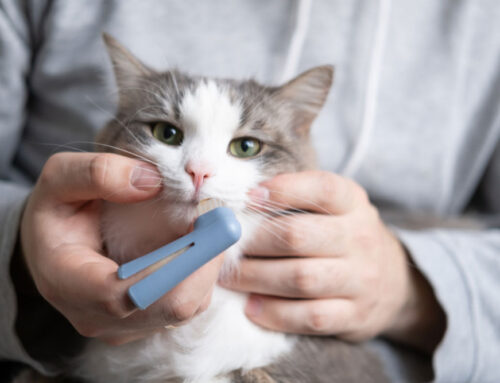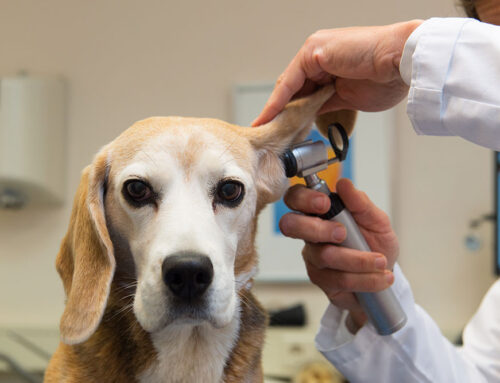Your dog or cat can’t tell you when they feel different or sick, but you can pay close attention to their behavior and habits to deduce when your furry pal feels out of sorts. A change in your pet’s eating or drinking habits is often caused by an underlying disease, which could worsen if the condition goes untreated. Through physical examination and diagnostic testing, our Palm City Animal Medical Center team can determine the nature of your four-legged friend’s problem and help them feel like themself again. To learn the most common reasons why your pet’s eating or drinking habits may have changed and how our team can help, read our overview.
#1: Kidney disease in pets
The kidneys filter the blood’s waste and create urine in the process. Kidney cells work hard to conserve fluids, proteins, and minerals, but diseased kidneys are unable to maintain the correct balance, resulting in excess fluid losses. Your dog or cat must drink more water to combat dehydration. Pets with kidney disease also frequently lose their appetite and lose weight.
#2: Cushing’s syndrome in dogs
Cushing’s syndrome occurs when the adrenal glands produce an overabundance of stress hormones (i.e., cortisol), causing an affected dog to have an increased appetite, weight gain, a pot-bellied appearance, hair loss, and skin problems. A benign, hormone-producing tumor in the brain’s pituitary gland usually causes this disease. However, your canine companion may have an adrenal gland tumor, or the gland may have become enlarged. Treatment is typically medical, as surgery is risky.
#3: Hyperthyroidism in cats
A cat whose body produces an overabundance of the thyroid hormone (i.e., hyperthyroidism) has an overactive metabolism, which causes weight loss, ravenous hunger, fast heart rate, high blood pressure, and digestive issues. To treat your affected feline friend, our Palm City Animal Medical Center team may administer a radioactive iodine injection to kill the overactive thyroid cells, surgically remove the enlarged gland, prescribe medication to suppress hormone production, or recommend a special diet.
#4: Diabetes in pets
Diabetes occurs when the pancreas no longer produces insulin, or the body becomes immune to insulin’s effects. Without insulin, the body’s cells do not use food’s glucose, which builds up in an affected pet’s bloodstream and excessively increases urine output. A diabetic pet urinates more as the glucose draws excess water into the urine. In response, an affected pet drinks more to compensate for the fluid loss. In addition, despite increased hunger, a diabetic pet loses weight. Untreated diabetes can cause your furry pal to develop diabetic ketoacidosis, which requires emergency veterinary care. Therefore, if you suspect your four-legged friend has diabetes, schedule an appointment with our Palm City Animal Medical Center team as soon as possible, so we can diagnose your pet’s condition and prescribe treatment such as insulin injections and a special diet.
#5: Dental disease in pets
Dental disease is common in pets older than 3 years of age. This disease develops as a result of bacteria accumulating around and under the gumline, attacking tooth attachments and the jawbone. If your furry pal has dental disease, they may have loose, painful teeth and infection deep in the bone. As a result, your four-legged friend may refuse to eat hard or crunchy foods or stop eating altogether. To resolve your pet’s oral health issues, they need a professional dental cleaning. In addition, regular at-home dental care, including toothbrushing, can help maintain a healthy mouth.
#6: Stomach or intestinal issues in pets
Diseases or conditions that affect the stomach and intestines can make your furry pal feel nauseated and less likely to eat. Gastrointestinal (GI) problems can be acute if they eat something new, contract parasites, develop a bacterial infection, or swallow a foreign object. Chronic GI problems include inflammatory bowel disease (IBD), intestinal lymphoma, pancreatitis, and food allergies. Exocrine pancreatic insufficiency (EPI) increases an affected pet’s appetite but causes weight loss, because their body cannot absorb foods’ nutrients. Treatments for GI problems typically involve medications. However, if your four-legged friend has swallowed a foreign object, they may need surgery.
#7: Pain or illness in pets
Pain is a powerful appetite inhibitor and can stem from any underlying disease or condition. A pet may also have an illness that causes no pain but makes them feel generally unwell, diminishing their appetite. Illnesses that inhibit a pet’s appetite include arthritis, dental disease, liver disease, severe skin disease, and heart disease.
#8: Aging and cognitive dysfunction in pets

Some aging pets lose their sense of smell, which is linked with appetite. In addition, some senior pets develop cognitive dysfunction (i.e., dementia), which can cause them to lose interest in eating, or they simply forget to eat. Treatments for these conditions include keeping a regular schedule and feeding an enticing, aromatic diet rich in antioxidants.
Changes to your pet’s eating or drinking habits are a red flag that they are ill, and you should promptly schedule an appointment with our Palm City Animal Medical Center team. Through appropriate testing, we can diagnose and treat your furry pal’s health issue and quickly put them on the road to recovery.








Leave A Comment